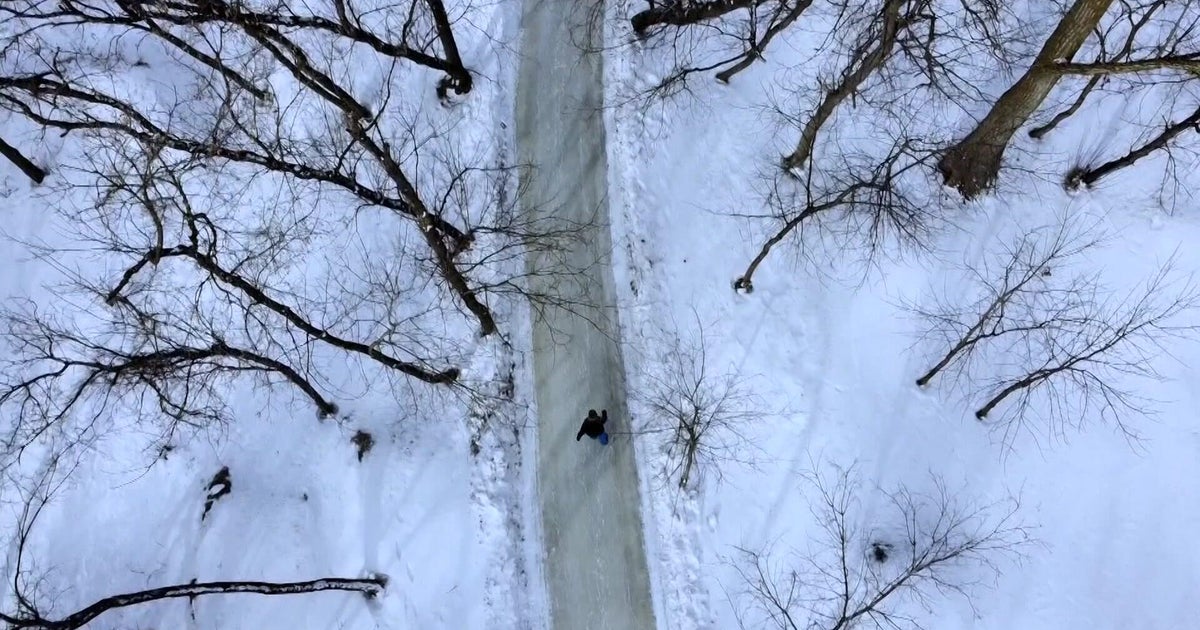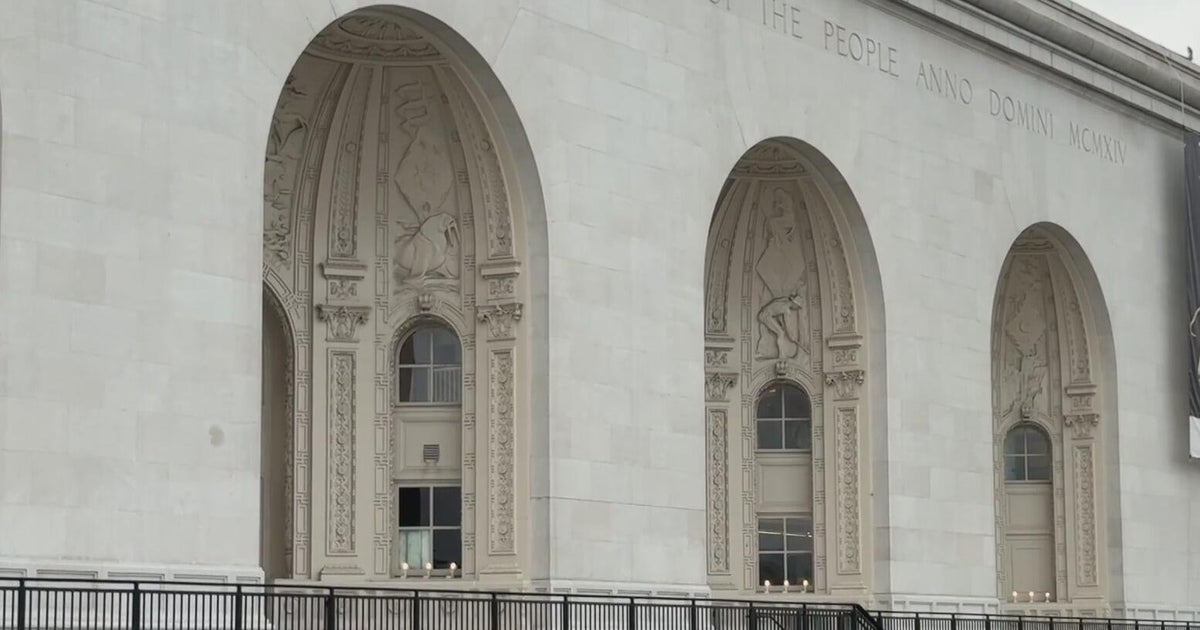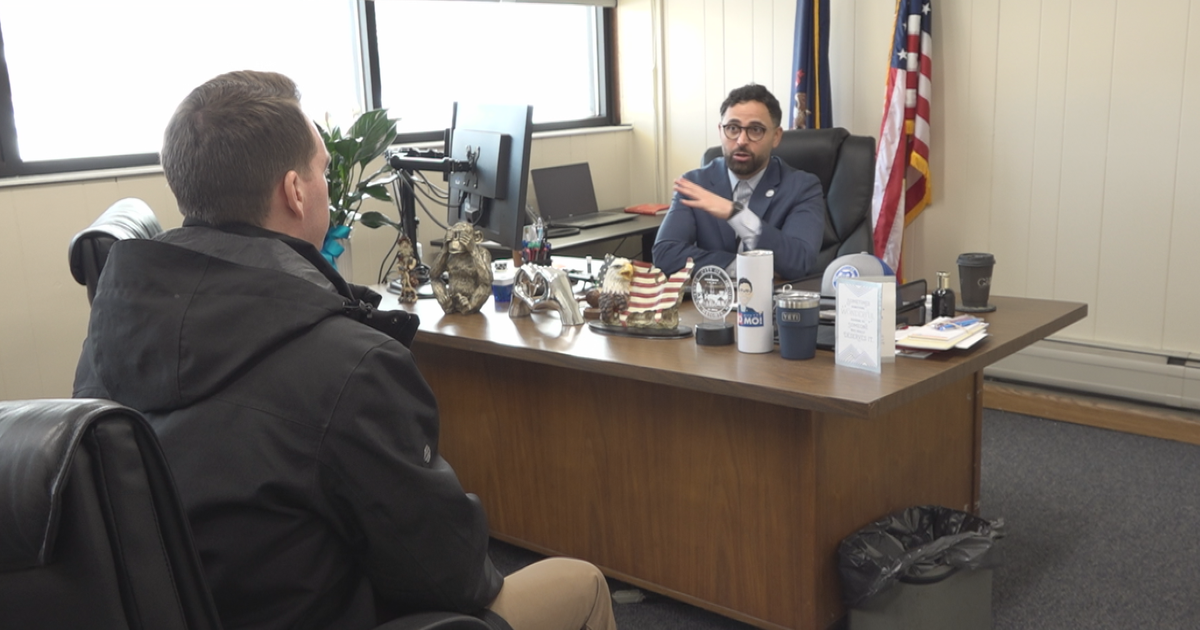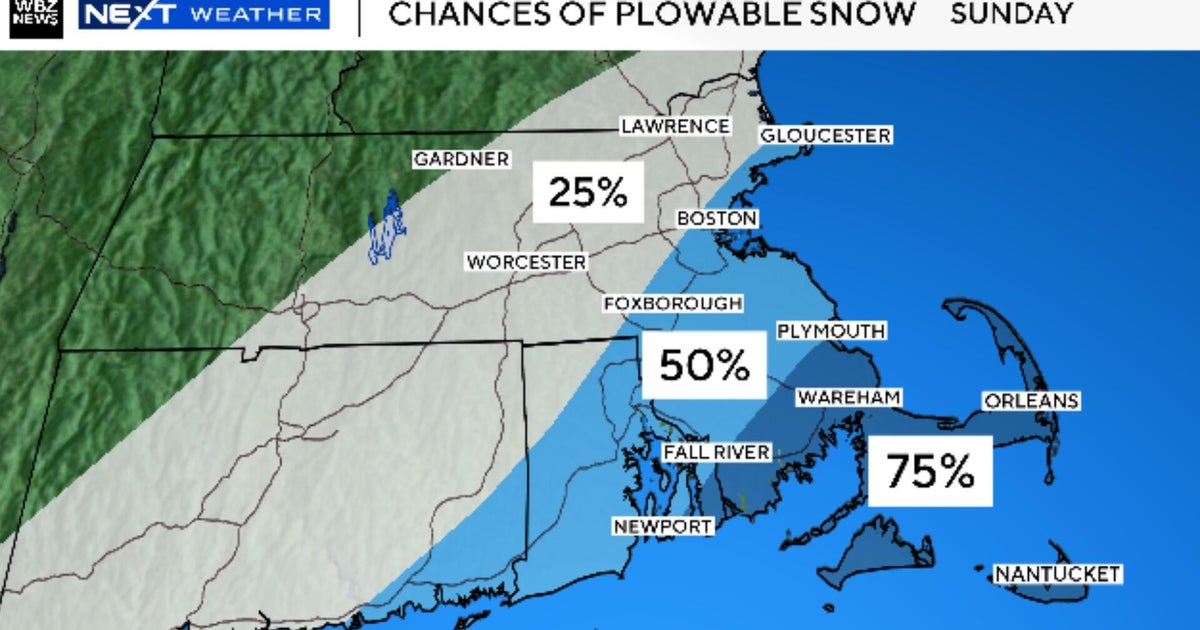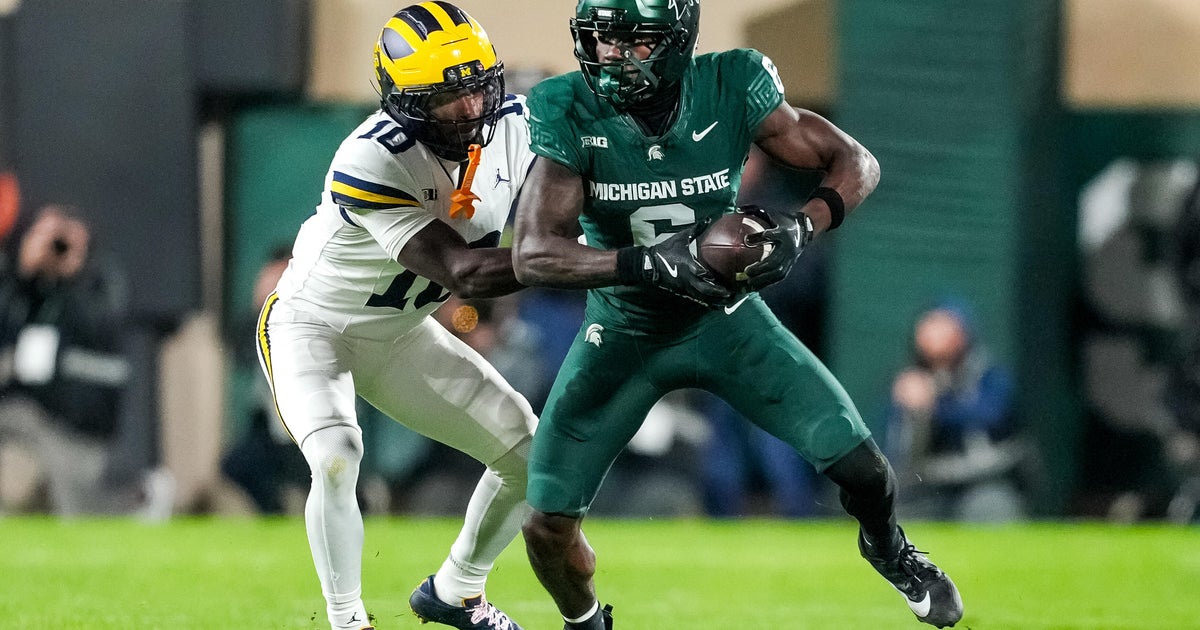CBS SF talks to pioneering skate-punk band the Boneless Ones (Part I)
SAN FRANCISCO (CBS SF) -- Three members of legendary '80s East Bay skate-punk band the Boneless Ones recently spoke with CBS SF about the upcoming release of the group's first album in over 35 year being celebrated with a couple of special CD release events this weekend.
Inspired by the classic Thrasher Magazine punk compilations of the early '80s, the band contributed a pair of tunes -- "Keg Kept a Flowing," a parody of the oft-covered, blues-rock staple "Train Kept a Rollin'" -- and the original song "Love to Hate" -- to the Bay Area punk imprint Boner Records' seminal collection Them Boners Be Poppin' alongside such hardcore greats as Tales of Terror, Fang, Verbal Abuse and Bl'ast.
In 1986, the group released it's debut album, the landmark skate-punk effort Skate for the Devil that stands as one of the Bay Area's great contributions to the crossover movement. While the band would split up the following year, Boneless Ones reunited in 2019 with original singer Max Fox and bassist Troy Takaki teaming up with a local metal and punk legend for their new line-up featuring drummer Chris Kontos (Attitude Adjustment, Machine Head, Verbal Abuse and many others) -- who actually played in the Boneless Ones during the last six months before the split. [Full disclosure: Chris and I met while in elementary school and later reconnected as teens and later still as adults going to metal and punk shows.]
The band played the 2019 Haight Street Fair and a few other shows with a couple of guitarists before hooking up with talented six-string hero Craig Locicero (Forbidden Evil/Forbidden, Manmade God, Dress the Dead and more), who has ably filled the sizeable shoes of original guitar player, the late Luke Skeels.
In addition to reissuing the long out-of-print Skate for the Devil on Beer City in 2020, that December the band put out it's first new tune in decades just before Christmas with the hilarious seasonal punk anthem "Santa Stole My Skateboard." With the pandemic shutting down touring and live music in general, the Boneless Ones teamed to write new songs to go with four tracks from a long-lost demo that was originally recorded in 1987, coming up with material for the group's first new album in over 35 years, Back to the Grind.
Capturing the same mix of irreverent humor and and blistering punk-meets-metal skate anthems that made Skate for the Devil a timeless classic, the new effort set for release in May delivers neck-snapping musical mayhem ("We Ride The Night," "Church Of Violence," "Crossing Over the Bridge") that longtime fans will readily embrace while delving into new territory on the Beatles-esque lament for lost lust "I Wish You Were Beer" that manages to be both heartfelt and hilarious. CBS SF recently spoke with Kontos, Fox and Locicero in two separate interviews about how this line-up and the new album came together ahead of the group's CD release celebration at the Ivy Room on Saturday night [Editor's note: This interview has been edited for clarity].
CBS SF: Four of the tunes from Back to the Grind are new recordings of songs from the band's 1987 demo, which was the same year you started playing drums with the Boneless Ones. Did you play on those demos or work on those songs with the guys?
Chris Kontos: No, those were actually the last songs before Tim Stilleto left the band. Tim was the drummer on Skate for the Devil. They recorded those songs and then Tim split and they kind of got canned. And that's when I came in. It was kind of like walking into a hornets nest when I joined the band. They were already kind of breaking up.
So I was in the band a very short amount of time. I played the band's last shows and then the band broke up. So I didn't play on those [demos]. It's funny, when we got back together, the time had kind of been calling. Luke Skeels, the original guitar player, had passed away. And we thought, "Hey, let's just get back together and record those songs." And then it was like, "Hey, let's play the Haight Street Fair!"
And then all of this legacy started to expose itself and all this reverence. And we were like, "Hey, should we do another show? Should we write some more songs?" And we went through a couple of guitar players, and it just kind of slowly just built up into this reunion.
Max and myself had been talking about getting the band back together in 2017 and were kind of holding off, then we really got to thinking we're gonna do it, and then the Machine Head thing kicked off [Editor's note: Kontos toured extensively with Machine Head in 2019 and 2020 to mark the 25th anniversary of the band's debut album, Burn My Eyes]. So I did the European tour with Machine Had, and then when I got back, we did the Haight Street Fair. And then I did the U.S. tour with Machine Head. So there was a little bit of a stumbling block in the starting gate for us getting fully going.
CBS SF: So did the Boneless Ones ever considered trying to get back together before the Haight Street Fair gig?
Max Fox: No.
CBS SF: Chris alluded to the fact that when he joined the band, it was a pretty volatile situation and not long before the split happened...
Max Fox: Chris was in for the last six months of the band's three-year run.
Craig Locicero: And that was when I saw them. It was one of those gigs with Chris.
Max Fox: By the time Chris came in, there was already kind of a power play going on. He came in right at the tail end. I think the term he likes to use is "hornets nest."
CBS SF: So the writing of the new material was done during COVID, working the tunes out in your spare bedroom?
Chris Kontos: Yeah, it's the room I'm in right now, actually. We went through a couple guitar players and we really weren't writing. We showed those guys the the four demo songs and then we were playing tracks off of Skate for the Devil. No slight on those other two guitar players that we were playing with, but it just really wasn't meeting the brand.
Luke Skeels was a phenomenal talent. He was one of Joe Satriani's first ten students, so he had a lot of guitar skills. Maybe too much for a punk band or a goofy, skate-rock band. The tongue-in-cheek thing about it was like, "Wow, this guy is way too good to be in this band." He did all the guitar tricks, the whammy bar tricks, and all that classic thrash and guitar shredder stuff.
CBS SF: One thing that really struck me initially when I was listening to Back to the Grind, I thought, "This is punk rock, but with Eddie Van Halen-style guitar." I thought that was unusual, but then when I went back and listened to Skate for the Devil, it was very much in the same spirit.
Craig Locicero: Well, I guess that's where I come in. I mean, you didn't ask how I got here, but I'll just say once I was in, once I met the guys and once I sat down and listened to Skate for the Devil, I knew exactly what approach I wanted to come in with.
And it was just a matter of me going back on into my influences, my bag of tricks. But I was already a big fan of Luke, the original guitar player. I saw them play their last show in Berkeley on the campus, when the cops showed up and everyone's scattered and I was blown away, I was a kid. I was probably 16, maybe 17. I might've just turned 17.
I was standing there with [then former Exodus singer] Paul Baloff and my bass player for Forbidden, Matt Camacho, just watching, and I was like -- I've been quoted as saying this -- "This guitar player is way too good for punk rock." Not that it's a slam on punk, but you usually keep it real simple in punk. Even if you are a guitar player, you don't try to show too many things. But Luke was like, "I got tricks!"
So I remember seeing and hearing that. And then when I started seeing Boneless Ones hats again, and I was like, "Oh, they're back. Okay." And I didn't know what happened to Luke. I didn't know anything. And I knew that Chris was starting to wear the hats again. And I ran into him. He said, "Yeah, we're just doing a couple shows." And then I got a fateful phone call.
Chris Kontos: It just really wasn't working out. So I just said, "I'm going to call Craig." I played with Craig in a band called Spiral Arms. I've known him for 35 years. We approached him in the same kind of way, like, "We have these four songs and, you know, maybe myself, Max and Troy can can write some more songs and see if you can maybe complete them."
Craig Locicero: Chris said, "Hey dude, we're trying to write music and it's just not jiving. We don't have a guy that has all those influences that Luke had in his back pocket. Would you be interested in coming over and talking?" So that's really where it began. And I just went and talked and listened to them talk. I pretty much already loved Chris and I fell in love with the guys right away. These guys are nice. They're smart. They're wiser. They're older. I can at least entertain the idea of maybe writing some music with them. I came up with a couple ideas for songs and came to our first rehearsal that we put them together pretty much the first day.
Chris Kontos: Craig absolutely caught fire. He ended up writing like eight songs and bringing them to the table, and then we as a band completed them.
Craig Locicero: The first day, Max already had lyrics laying around that fit right in like a glove.
Max Fox: Literally laying around, waiting for music. I'm not even kidding either.
Craig Locicero: That's how smooth the transition really was and how fast we all clicked. Chris and I click on multiple levels. We played in Spiral Arms for years. Never played metal together, even though we both have a really huge metal background. We just hadn't done it. So it was our first chance to combine the metal and the crossover and the punk and everything and I just knew where to land it.
I loved so many of those old bands. We played with MDC, we played with DRI, we played with RKL -- all the three-letter bands, this is Forbidden Evil I'm talking about. So those are all influences of mine: SOD, Discharge, GBH, Suicidal Tendencies. They're all there. I can go on and on and on. People think of me as the metal dude or the rock dude, but I'm pretty well versed.
CBS SF: So it wasn't a stretch for your style. Basically it sounds like it was a perfect fit.
Craig Locicero: In a very strange, cosmic way, it was exactly what we all needed at that time. They were missing me. I was missing them, because my other band, we didn't get to play much. We had a lot of people die. We had family members and friends dying over the years -- this is Dress the Dead I'm talking about. So there was a lot going on there. And then these guys came in and I was like, "Oh, I can use something like this right now. I don't have to f--king think too hard and I can just ease into this." And then it just became like fire. So there you go. The rest is...whatever it is. It's either going to be history or just a nice little story.
CBS SF: Max, you already sort of touched on this, but I was wondering if as far as the lyrics, were you still writing when you were not in a band? Are these old lyrics from way back when?
Max Fox: No, I have a whole book full of written lyrics at this point. I never stopped writing lyrics even when we stopped [playing]. I've found it very cathartic and kind of therapeutic. The lyrics that I wrote for Skate for the Devil were written by a 17 or 18-year-old kid that was focused on a few different things.
These new lyrics, I did two different things: I either wrote long stories, which harken back to the Boneless Ones or I wrote short punk rock lyrics, and they're all new. And a lot of them were much more...the skate-punk songs are just "Go skate! Go skate!" But the other songs are much deeper. I hate to say adult, because that sounds like porno, but they focus on more of a grown-up aspect of things. People passing away, like Craig just mentioned.
We're 50-year-old men now. So now we've lived lives. We've gone through 10 cars, we've gone through five pets and we've all lost about 10 friends. And those things hit hard. To be perfectly honest, these were songs that have built up in me over the past 30 years. That's the cathartic part. That's the therapeutic part/ I was able to let loose a lot of stuff.
A lot of people listen to them and go, "Uh, that's kinda heavy." And I go, "Yeah, that's kind of heavy" you know? Because none of the lyrics in any of these songs are bulls--t. They're all written from the heart. So they're all new lyrics to answer that question right there.
CBS SF: Chris, you mention in the album press release that your approach to the drums while recording was consciously not in the same style you played with Machine Head, even though this was after the European and U.S. tours. Was it hard to move away from what you had been doing for a good part of the two years prior? Or was it easy to keep things simpler?
Chris Kontos: I've always said it's kind of like martial arts; if you learn just one martial art, you're kind of pigeonholed, you know? My mom told me when I was little, "Learn it all kid. Be that drummer that can sit down and play whatever." And I've always kind of prided myself on being able to kind of be a chameleon and put my mark and my thumbprint on whatever I'm doing and still be stylistically my own.
So going into this record with the standard that was set forth with Skate for the Devil, it's got a very rock and roll approach to punk rock. Tim Stiletto was like the punk-rock Tommy Lee. He did all the stick tricks and it was the real fabulous kind of drumming without being overly technical. So I wanted to kind of keep that brand and kind of keep it real solid real air drum-able and real giving to the listener as opposed to being mind-blowing, mathematical drumming.
And that's not really my style anyway. I'm kind of a frozen caveman drummer. So I wanted to keep it real like solid, create a lot of space and a lot of room for the guitars and the vocals to breathe. I wanted to let Troy shine and work with him rhythmically. So we really kept it rock and roll. I think we pulled that off. I'm pretty proud of what we did.
It was a real goal of ours to really stay on brand. And a lot of bands get back together after years and years and they try to chase the current trends. Like Chrissie Hynde said, the better you are as a musician, the less punk rock you are. So you can't fight that. Your talent is going to improve over the decades. What we wanted to do was not dumb it down, but stay true to what the Boneless Ones are about and deliver what the Boneless Ones are expected to deliver. So that was our goal and I think we did that.
CBS SF: The new record sounds fantastic. When you compare it to the fidelity of Skate for the Devil -- which essentially was recorded on an eight-track by kids -- it makes sense that there's this quantum leap forward. Was there ever any concern about preserving the rawness of the music while still upping the production quality?
Chris Kontos: Actually, we did want it to be kind of competitive sonically with what's out there. We didn't want it to just kind of meet the mark of the past with like that raw, lo-fi vibe. And that's a product of the pre-production that we were getting out of recording demos into the computer.
We rehearsed here in my spare bedroom. I wrote all my drum parts on my electric drum kit and we did the whole thing on headphones, straight into the computer. Our pre-production sounded amazing, so it kind of set the bar as we were writing and recording these these new songs. Like. "We've got to beat the sound of these pre-production songs. If we can capture this and maybe even make it better, we'll really have something on our hands."
So we knew we were gonna have to take it kind of serious and go into a heavyweight studio and use some heavy, heavy hitters to record this music. We went into Shark Bite Studios in Oakland, where Machine Head records and a lot of other bands. We used Zack Ohren [Machine Head, All Shall Perish, Exmortus] to record the songs and he just knocked it out of the park.
He was super encouraging and egging us on; "Was that really the take? Do you want to try that again?" He really pulled a lot of great performance out of us. It was different for Troy and Max, because they had been out of the recording thing for 35 years, so it was a bit of a hyperspace thing for them to be cast into this big-time recording. And they stepped up to the plate and, again, knocked it out of the park.
So what we focused on was keeping the performances raw, and keeping the energy raw, but then meet it a little bit north of the expected production of the style and the genre. We wanted it to sound massive and super clear and have really deep tone. We've got those guitar solos just cranked on the thing. I mean, they're loud solos, and I'm a huge fan of guitar solos really being present.
And you know, that was another thing that Luke brought to the table was that Guitar Hero kind of vibe. So I knew I didn't want the battle for frequencies going on to where you can't really boost the solos. We wanted the solos to be as loud as the vocals. We organically thought we would walk away with something a little bit more raw. But Zach captured incredible tones and signals.
And when we left with the finished product, we were like, "Wow, we're gonna have to really get this mixed professionally." So we reached out to Matt Winegar [Primus, Chuck Prophet, Fantastic Negrito], Grammy-winning producer and mixer. And again, he fell in love with the music. He just took that Grammy golden touch and just gave it that sheen without taking it to over-the-top production. His mix far exceeded what we thought we were gonna get. So we're just thrilled with what we have on our hands right now.
Craig Locicero: I think Skate with the Devil is an incredible record. And I will say this: when I did join the band, I made a playlist of all my old favorite punk s--t and I added that to it. And every time it came up, it literally sounded fatter and a little bit more explosive than a lot of those things that I think of as really amazing sounding records. There was just a width to it and a process that went into recording guitars. I asked the guy who engineered at about that and he told me a little bit. What they did wasn't what I thought it was. There are four guitar tracks on Skate for the Devil going at one time, which is amazing. It sounds huge. Sometimes you catch magic by mistake. I don't think they knew exactly what they were doing when they recorded the guitars like that, but it came out massive.
I didn't want to redo it like that at all. I was looking to make it like on the edge of a razorblade, very unmessy, but I didn't do any fixes on my rhythm tracks. I made sure I went into it like saying, "OK, we're going to do this one time, then I'm going to do another track on the other side." Unless I blatantly f--ked up, which I barely did on this recording. I kept everything like, "Bang! Bang!" And that goes all the way from the day we recorded it to the day it was mixed.
And I'll tell you, most guitar players and producers these days are not fans of that, but we chose all the right people then that supported my vision on keeping it raw as f--k and then make it sound great in the mix. Instead of fixing it, just mix it. I knew from the beginning that we wanted Zack Ohren, because he gets great tones. It's all about how you record things. You use the right mic and you have the right guy listening and you don't need to f--king move around and fix s--t, right? You just do it and it sounds great because it's hitting the recording gear right. It was engineered amazingly well, so that's the first thing. So we didn't produce it as much as we just recorded it really well, and then handed it off to Matt Winegar.
Once the album was done, I approached the guys about him doing it. I said, "Hey, nothing for nothing, a fresh set of ears like Matt's would be amazing." Because he'd give us a rock mix instead of a metal mix, which is something I really wanted. Matt is a good friend of mine from since we were kids in Fremont. He produced those early Primus records. He was a whiz kid. Everyone was like, "That whiz kid Matt!"
And now that whiz kid has won two Grammys. In the last five years he has blown up. I sent him "Bones of Rock" and said, "Do you want to mix this one?" And he said, "I'd love to give it a shot." And he sent it back to us and it just blew our minds, because again, he didn't fix a thing. He just made sure it all was loud. I said, "Everything loud! Just make everything loud!" We went back and forth and did those mixes together and everybody gave their input, but it was the easiest process ever, dude.
Just like writing the record or the recording, the mixing process was relatively easy. There's always going to be something that happens, but the amount of somethings was less than any other session I've ever done in my life. It was really pretty simple. The human element came in there every once in a while, but I think overall we nailed it down.
Max Fox: The human element came in there more than he's letting on. Craig's downplaying it. Don't get me wrong; I'm not trying to contradict him. But Craig worked with Matt Winegar eight hours a day for 14 days straight. Calls back and forth and listening to tapes. Craig's incredible as far as what he did in post-production.
Basically we got an offer to be flown somewhere, be put up in a hotel and to go to the best studio in this one town. And we turned it down. We said, "No, we want to stay in our home base. And we want to go home at night and sleep in our own beds." Craig knows everybody. I don't know if you know about the sound effects on "Blood on the Streets," the sound of tires burning out, but that was done by an Oscar-winning guy who worked on the sound for "Ford vs. Ferrari."
So we've literally got an Oscar-winning guy helping us with the sound effects and a two-time Grammy-winner doing the post-production. Every step of the way was up and up and up. When we got done, I just kind of walked away and said, "Jesus Christ! This is just incredible."
Craig Locicero: That's one way of looking at it. It is true I was talking to Matt a lot, but it wasn't like we were fixing things. It was more just making sure this was loud enough and that was loud enough. A lot of times you'll hear my guitar when it's not exactly perfect, and doubles that'll stack a little strange, but that's the magic man! Why do people change that s--t! Don't change it. So it was never about that. It was about just making sure the levels and the tones were right.
And the other thing is all these great people we're talking about, all lent themselves through the process of not overcooking it because they loved it. The first thing Matt said when he heard us, he was like, "You know, there's a lot of charm in this." That was his quote. And it's something that I would hate to be ruined if somebody mixed it either too perfect or too metal. So he had no problem adhering to a "let's do less with more" approach.
Max Fox: A lot of these people heard it and were warm to it. You know what I mean? The people in LA, Zack to a certain extent -- though he kind of a stone-faced guy. Matt was super stoked. His daughter got a skateboard and all this different stuff. So some very interesting people warmed up to it and went, "Oh man, I want to do this!" And you can't pay for that. You can't pay to have people warm up to what you're doing.
Part II of this interview featuring the members of the Boneless Ones talking about the stories behind specific songs on the new album and how the Bay Area's culture helped contribute to the crossover phenomenon in the '80s will be published in the coming days.

